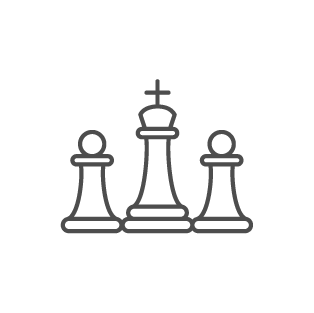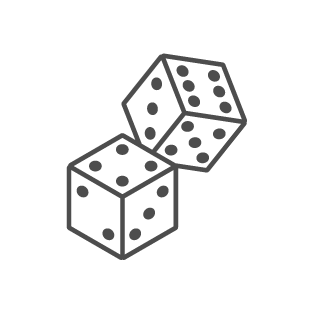Find out about these common beliefs that contribute to problem gambling
Gambling Myths Vs. Facts
MYTH: "Lucky" people have better chances to win at gambling.
FACT: There's no “luck” involved. Each outcome is always random.
MYTH: "Cold" machines that haven't paid out in a while are due to pay out.
FACT: The outcomes are always random, every time.
MYTH: "Hot" machines that have been paying off all day will likely continue paying off.
FACT: The outcomes are always random, every time.
MYTH: If you lose at first, just keep playing and you'll win it back.
FACT: “Chasing” a win often leads to losing more and more.
MYTH: Casinos cheat to get your money
FACT: They don't have to cheat.
MYTH: You need a good "system" to win at slots.
FACT: The outcomes are always random, every time.
MYTH: Using good luck charms will increase your chances of winning.
FACT: There's no “luck” involved. Each outcome is always random.
MYTH: There are books and websites that can help you learn to be a better slot player.
FACT: There are no “experts” at Electronic Gaming Machines. The outcomes are always random, every time.
MYTH: Gamblers are bad at math.
FACT: Many who problem gamble are actually great at math. Unfortunately, the random outcomes of gambling cannot be predicted.
MYTH: If you keep track of when a machine typically pays off, you can increase your chances of winning.
FACT: Casinos can’t set up the machines to pay at particular times of the day or week
MYTH: If you have won several times in a row, you are likely to continue winning.
FACT: Winning in a row has no impact on whether you continue winning.
MYTH: If you keep track of winning symbols and near-misses can figure out when the machine will pay out.
FACT: You cannot increase your odds at the slots by keeping track of the lemons and other symbols
MYTH: Machines located in certain locations in a casino are more likely to pay out.
FACT: Slot machines near the doors and aisle don’t pay more often than others
MYTH: If you wear the same lucky socks each time you bet, you are sure to win.
FACT: Following superstitions/rituals does not affect your chances of winning.
MYTH: If you spend a dollar on a lottery ticket, you may at least win a dollar, so you're ahead.
FACT: Think about that for a minute.
MYTH: If you pay attention to patterns, you are more likely to win.
FACT: Outcomes are ALWAYS RANDOM. EVERY TIME.
MYTH: A "near miss" indicates you were about to win.
FACT: Outcomes are ALWAYS RANDOM. EVERY TIME.
MYTH: If you have spent a lot of money on a gambling endeavor, you should keep spending or your investment is lost.
FACT: The money already spent has no impact on the potential for winning.
MYTH: People who win the lottery live happily ever after.
FACT: Read The 10 Worst Lottery Winner Horror Stories In History
MYTH: If the Roulette Wheel has landed on red several times in a row, bet on black because it's due to come up.
FACT: Read What is the Gambler’s Fallacy?
MYTH: You can't get addicted to an activity the way you can to a substance.
FACT: Addiction happens in the brain, and can be in response to substances OR activities.
MYTH: You have to have money to become a problem gambler.
FACT: There’s no dollar amount threshold to have a gambling problem.
MYTH: There is no treatment for problem gambling-you just need to stop.
FACT: There are evidence-based treatments for gambling addiction, and most people who seek treatment benefit from it.
MYTH: If you don't gamble every day, you aren't a problem gambler.
FACT: Some people with gambling problems wager sporadically or on a binge. Many do not play every day.
MYTH: As long as you can pay your bills, your gambling problem hasn't gotten bad yet.
FACT: Problem gambling isn't defined by how much money you've spent, but by the fact that you continue spending time and money in spite of negative consequences.
MYTH: Kids can't become problem gamblers.
FACT: Studies have shown that youth are 2-4 times more likely than an adult to show problem gambling symptoms.
MYTH: You can tell by looking at someone they have a gambling problem.
FACT: Gambling addiction is often called the silent disorder, because unlike with substance abuse. you cannot see or smell it.
MYTH: Gambling is less harmful than many other ways to cope with stress.
FACT: The emotional, financial, and even physical toll of problem gambling can ruin people’s lives.
MYTH: Gambling addiction isn't as serious as other addictions.
FACT: Gambling addiction has the highest rate of suicide among all addictions.
MYTH: If you can find someone to pay off your gambling debts, you'll have a clean slate and be on your way to recovery.
FACT: Most people with gambling problems say that getting a "bailout" only enables them to continue gambling.
MYTH: The more money you bet, the more likely you are to win.
FACT: This idea is not supported by math.
MYTH: If you are a person with a gambling problem, at least you are only hurting yourself.
FACT: Too many times, the loved ones of people with gambling problems suffer as well.
MYTH: Letting kids gamble isn't like buying them beer or cigarettes.
FACT: In most cases, it is illegal for underage children to gamble. Most people with gambling problems report that they started gambling at an early age, and children are especially susceptible to the misconception that create people with gambling problems.
MYTH: Games like Bingo aren't really gambling.
FACT: Any game involving wagering money is gambling.
MYTH: You can't have "withdrawal" from stopping gambling.
FACT: Many problem gamblers report becoming restless or irritable when they aren't playing.
MYTH: Gambling addiction is very rare.
FACT: Studies have shown that around 1% of the population has a severe gambling addiction and another 2-3% show symptoms of problem gambling.
MYTH: To overcome a gambling addiction, you have to find a 28-day in-patient facility.
FACT: Most with gambling problems are successfully treated on an out-patient basis.
MYTH: Gamblers Anonymous is just a bunch of people sitting around telling stories about how much they lost.
FACT: Like other 12-step programs, GA revolves around a group of like-minded people encouraging each other in recovery.
MYTH: You'll never win if you don't play.
FACT: Okay, technically not a myth, but remember the more likely mantra "You'll never lose if you don't play."
House Edge
House advantage is the mathematical advantage the house or gambling operator has on most wagers made by the players. House advantage is built into the games so the casino/gambling operators will make money in the long run. House advantage comes in various forms, including paying the “casino odds” on winning bets rather than “true odds” for most games, charging a commission on winning bets (e.g. baccarat) or ensuring that the rules of the game are in its favor (e.g. players can bust before the dealer takes any cards in blackjack). The casino odds, or pay-off odds, are not the true odds of the game. For example, in roulette, there are 37 numbers on the wheel. The true odds of picking the right number is 1 in 37 but, if players win, they are only paid 35 to 1. This difference gives the house an advantage, ensuring that it will make money over time. In the short run, the players might find themselves ahead through sheer chance, but the longer they play, the more likely it is that they will lose money due to the house advantage. The other forms of house advantage, such as commission on winning bets or the rules of the games, have the same effect as paying less than true odds for the players. Some games have greater house advantage than others, but virtually all casino games have house advantage built into the games. Some players don’t fully understand these facts and feel they are being cheated after losing money over time. In fact, casinos don’t need to cheat or rig games — they already have the house advantage system built into their games to make sure they will make money in the long run. What these players have experienced only reflects the reality of gambling games.
Randomness
Another important fact is that casino games are based on random events. Casinos make sure that all their games are random and unpredictable, making it impossible to figure out a system for predicting what will happen next. For example, electronic gaming devices (e.g. slots) have a computer chip called a Random Number Generator that continually produces random numbers, even when no one is playing the game. When a player pushes the deal or spin button, it’s like blindly putting a hand into this river of numbers, pulling one out and putting it on the screen. If this number is a “winning number” (a winning poker hand or line-up combination), the player wins. If not, he or she loses. Unfortunately, there are always more losing numbers in the river than there are winning numbers. In games such as roulette, the spot on the wheel where the ball lands is completely random. In a blackjack game, no one knows for sure which card will turn up next from the deck of cards. For most casino games, as players become more familiar with a game, it’s natural for them to notice patterns. However, even if they notice what seems to be a pattern a few times, this “pattern” still only reflects what happened in the past. What will happen in the future will occur on a random basis — the next event is unpredictable and no one can know for sure what future outcomes will be.
Independence of Events
Another fact about casino games is that each event in a game occurs either totally or partially independently from all other events in that game — what’s already happened has little or no effect on what will happen next. For example, in roulette, each time the ball lands is totally independent of another time. The ball has no memory of earlier spins and lands at any one spot on the wheel on a random basis. Games such as blackjack are not totally independent because, once a card is played, the composition of the remaining deck changes, thus affecting the future outcomes of the game. While events in blackjack partially depend on each other, the multiple decks of cards used and the casino’s rules of the game mean that players are still unable to make reliable predictions on the outcomes. Independence of events and randomness are important concepts. If misunderstood, distorted and faulty beliefs about gambling games (e.g. “winning or losing streaks” or “near miss beliefs”) can arise.
Research shows those with gambling problems tend to have a poorer understanding of these concepts, making them more likely to have faulty beliefs. Frequent irrational thinking, myths, and beliefs provide “reasons” to continue gambling despite experiencing problems in one or all areas of their lives. Those who hold these faulty beliefs may be more susceptible to excessive gambling. Here are some examples:
Entrapment/Sunk Cost Fallacy
Those who problem gamble spend a lot of time, energy, and money gambling. After losing for a while, they begin to regard their expenditures as an “investment” rather than the cost of playing. Instead of walking away and accepting losses, the gambler continues to gamble in order to win back the money lost. This thinking creates a vicious cycle that entraps the gambler, resulting in persistent gambling despite mounting losses.
Belief in Lucky Streaks
Some gamblers believe that events happen in streaks. They gamble beyond their limits because they feel they are “doing well” or “in a lucky streak.” The truth is, events are random and unconnected. What they recognize as a “streak” is an erroneous belief, not the reality of the game.
Illusion of control
Gamblers begin to believe that wins are produced by their own efforts (e.g. how they throw the dice or push the button) rather than by the random operation of a gambling device or cards.
Systems
Gamblers believe that, by learning a certain system of betting, they can overcome the house advantage (doubling up, for example). While in the short run they might win by pure chance, in the long run, they would still lose money, as no system can beat the house advantage.
The Gambler’s Fallacy
This is the belief that if something has not happened for a long time, it is bound to happen. For example, some gamblers believe that if a coin has flipped heads nine times in a row, it is likely that the next flip will be tails. In reality, the chance of getting heads is exactly the same as it always is — 50/50. The notion that tails are due is just a common error that many people make regarding the randomness concept.
Near-Miss Beliefs
This is the belief that a gambler is about to win because his or her bets appear to get “close” to the winning number/bet. In reality, there is no such thing as “getting closer” to the winning number because, in gambling games, each event in a game has little or no effect on the next event. The belief that someone is “almost winning” is just a part of the gambler’s faulty perception.
Superstitions and rituals
Some gamblers begin to believe that certain objects, events, actions or supernatural forces may be helping or hindering their gambling wins.
Chasing Beliefs
This is the attitude that money lost by gambling has not really been lost because it can be recovered through further gambling.
Selective recall
Some gamblers choose to remember only the times they win, but do not acknowledge — or they “forget” — the times they lose.













